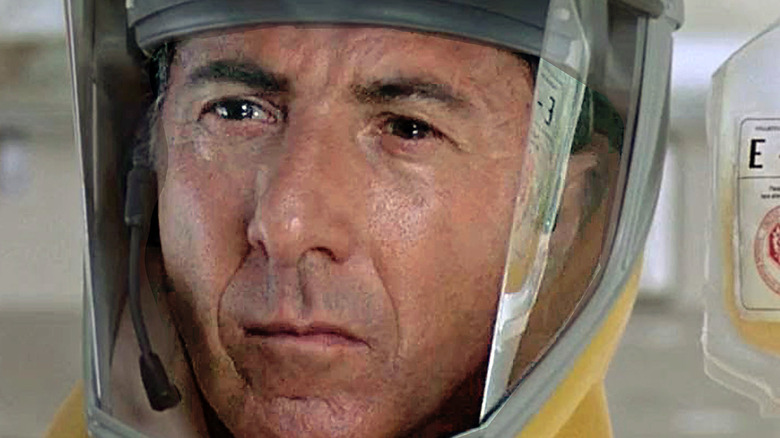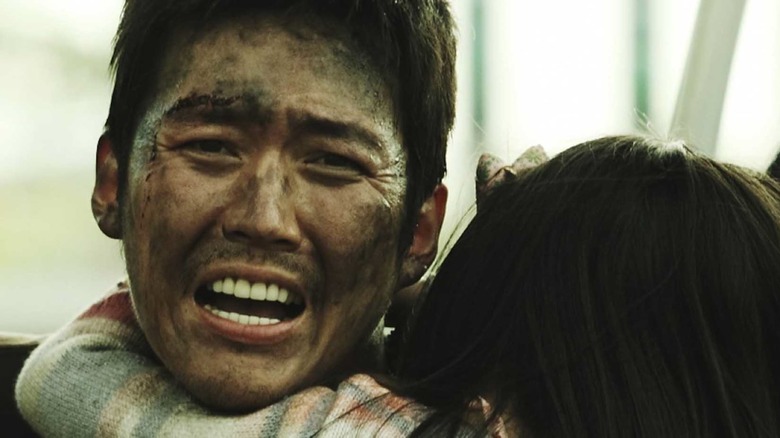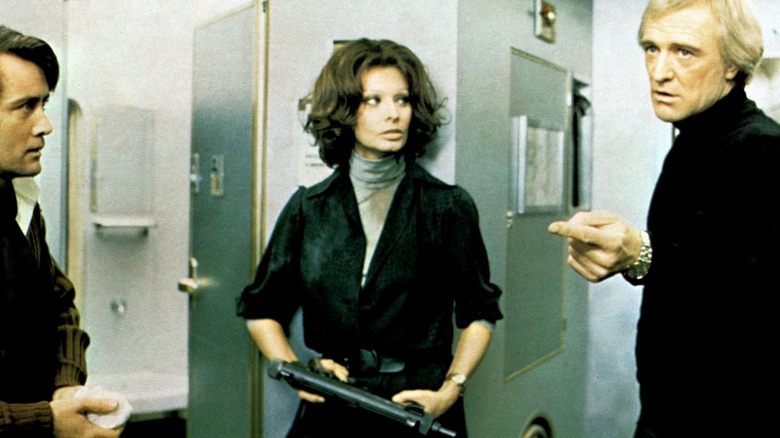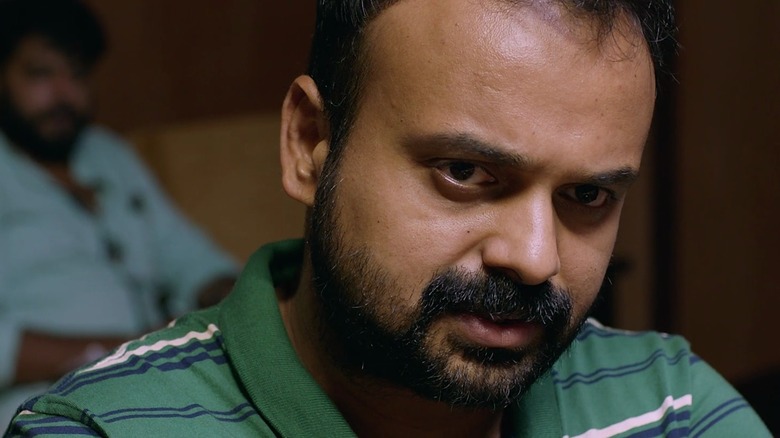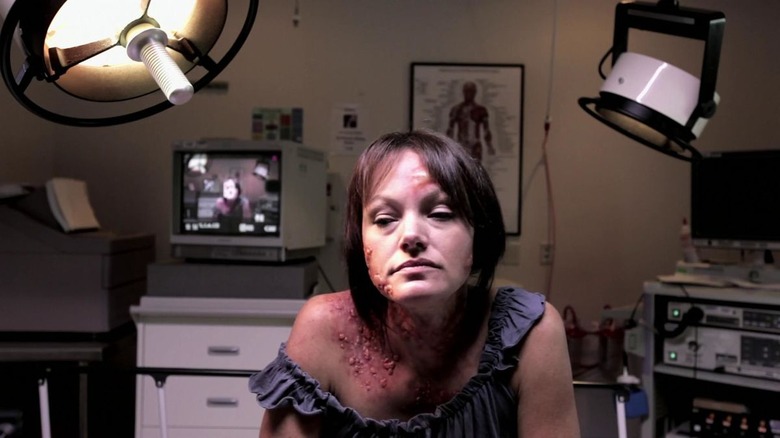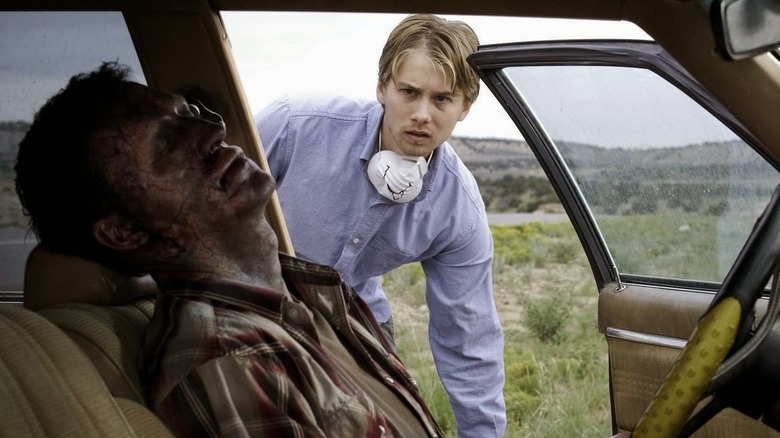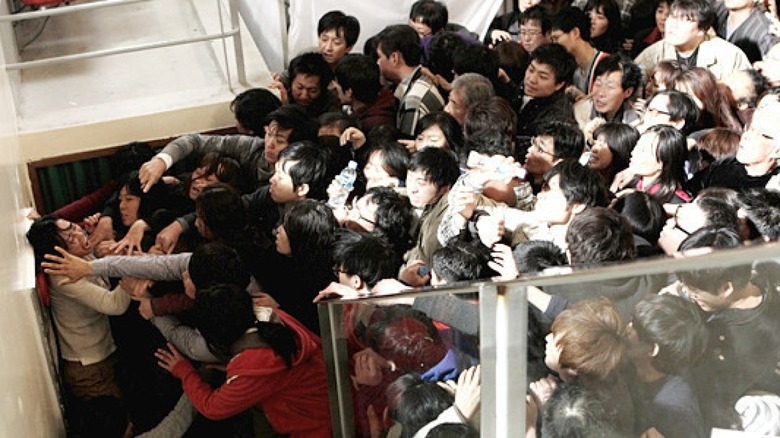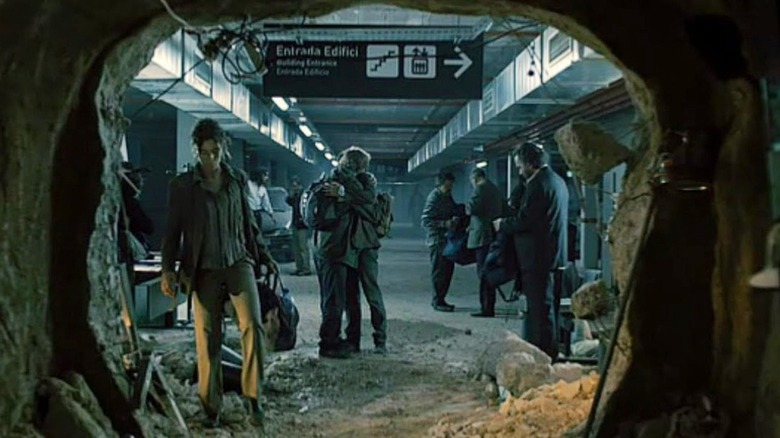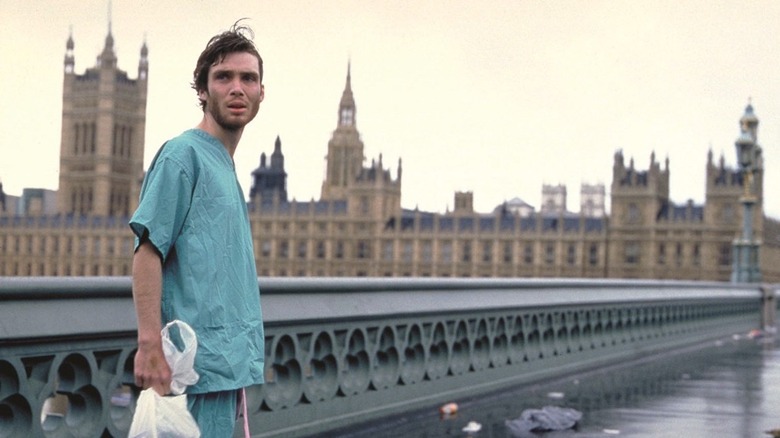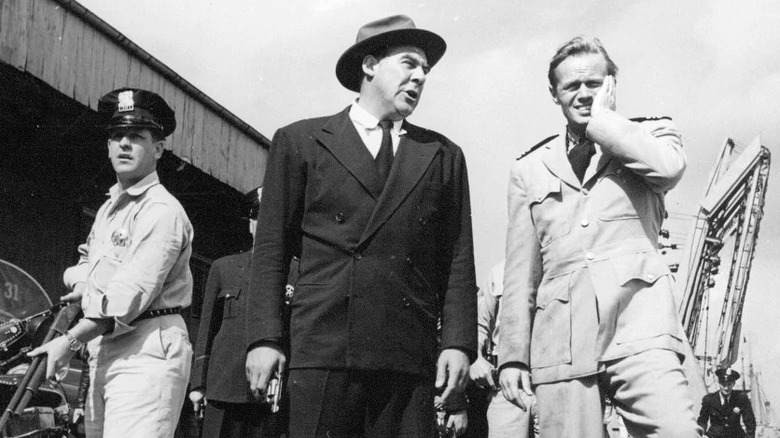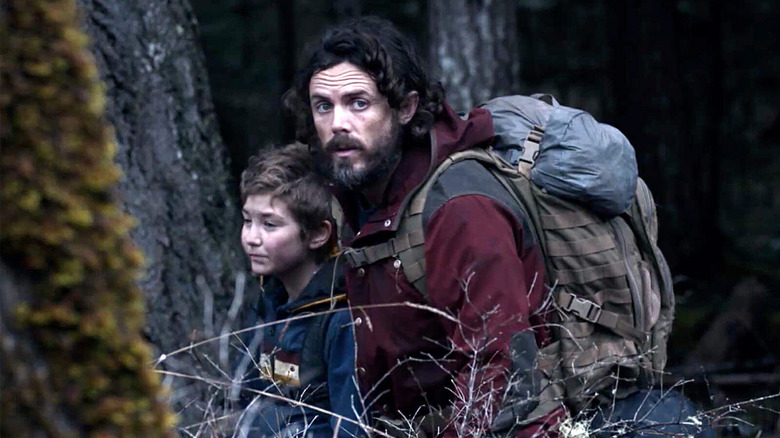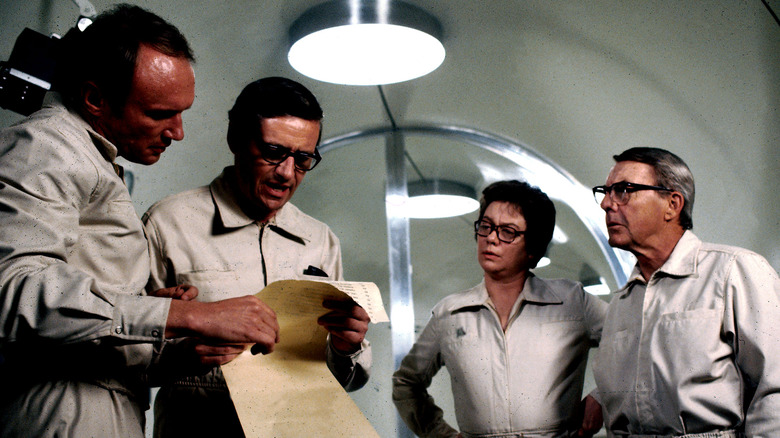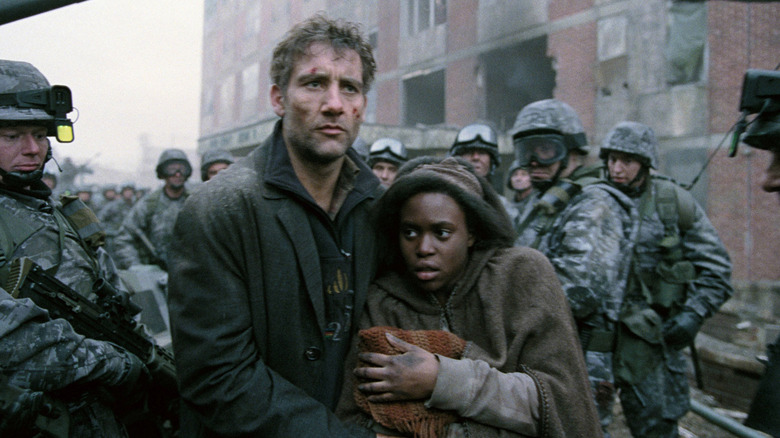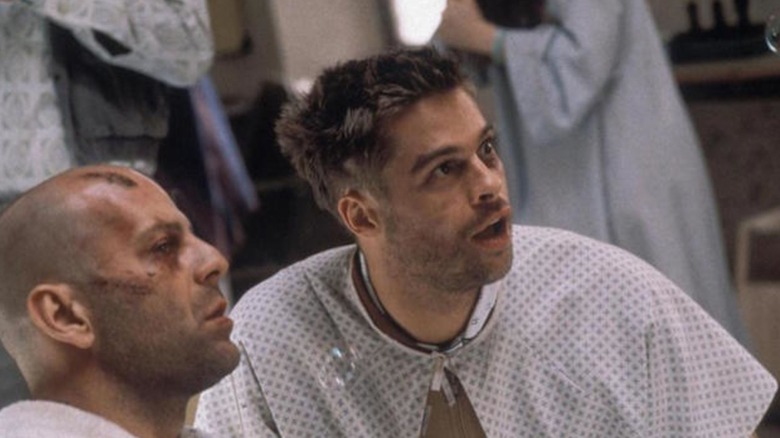15 Movies Like Contagion You Need To Watch Next
Few movies that examine pandemics and the way they impact civilization can beat 2011's "Contagion." The movie was created with the meticulous help of epidemiologists, experts in a vaccine race and a hypothetical government reaction, and a trained eye on the social impacts that range from isolation, grief, paranoia, and the viral spread of conspiracy theories and misinformation that threatens to undermine an effective public health response.
It was moderately popular when it came out, but it saw a burst of understandable attention last year, due to the parallels between it and the then-new and poorly understood COVID-19 pandemic. If you haven't seen it yet, do so now. It's not an easy watch, especially given all the terror of the past year, but it's a truly rewarding experience.
If you liked it, you'll almost certainly love the following pandemic movies. They range from hyper-realistic to science fiction, and some are more serious than others, but they're all worth a watch for any "Contagion" fan.
Outbreak
Based on Richard Preston's 1994 novel "The Hot Zone," this plague thriller follows the efforts of scientists to contain the Ebola-like Motaba virus in Zaire and California. The movie boasts an all-star cast including Dustin Hoffman, Morgan Freeman, Cuba Gooding, Jr., and Donald Sutherland, among others, and received critical acclaim.
There are three sad things worth mentioning: all the awards it won went to Kevin Spacey; there was an actual Ebola outbreak in Zaire at the time of the film's release; and, as we saw in the last year, the actual U.S. government wouldn't go to nearly the same lengths to contain a mysterious pandemic as the version of it featured in the movie.
Still, the movie's more than worth a watch. As Roger Ebert put it in his three-and-a-half-star review, "one of the great scare stories of our time, the notion that deep in the uncharted rainforests, deadly diseases are lurking, and if they ever escape their jungle homes and enter the human bloodstream, there will be a new plague the likes of which we have never seen." Little did he know how close he came to seeing exactly such a scare story unfold.
Flu
We're not sure why, but South Korea just can't seem to go wrong with films either based on or named after deadly illnesses. Preceding the recent batch by a few years was the equally tight and thrilling "Flu," a 2013 movie about a deadly outbreak of the fictional (but scarily plausible) H5N1. In the movie, the virus kills extremely quickly (often within 36 hours).
In real life, a disease with such pronounced lethality would run the risk of killing off all its victims before they had time to pass it to new hosts, thus neutralizing the virus. In the movie, though, it leads to the collapse of society in Bundang, which has just around half a million people. Stores are looted, crimes skyrocket, and drivers die behind the wheel, leading to fiery car wrecks. The events depicted are appropriately chaotic, but the movie's anything but: it knows exactly which strings to pull, and when, to deliver some of the best plague-movie scares of all time.
The Cassandra Crossing
Decades before 2016's "Train to Busan" made us terrified of infectious diseases on trains, 1976's "The Cassandra Crossing" did the same thing. In this film, a Swedish terrorist escapes with a bioweapon onto a train traveling from Geneva to Stockholm. Efforts to stop the train and rescue those on board are frustrated by the U.S. military, which believes that the train is actually keeping potentially infected passengers quarantined. On top of that, they're headed for the Cassandra Crossing: an unstable bridge that would likely collapse were the train to pass over it, thus neatly hiding the fact that the U.S. has been secretly harboring biological weapons in a neutral country to begin with.
The film is a bit of a mess, but easily fun and thrilling enough to be worth a watch. Oh, it also has O.J. Simpson in it. Maybe he knew a thing or two about being slowly chased by the authorities.
Virus
This Indian, Malayalam-language drama follows doctors in a government medical facility who struggle to understand and contain the Nipah virus, which is killing locals. Patients admitted to their college with the illness are experiencing fevers and headaches that rapidly progress to disorientation, confusion, and, in many cases, coma and death. The mortality rate? A terrifying 50%-75%.
Want to know something even scarier? The virus is very real. The film was based on an outbreak of the disease that took place in Kerala the year before the movie came out. The movie's not for the faint of heart, but it's a truly gripping thriller that gets to the heart of what it's like to be a member of the medical community on the front lines of a war against an invisible enemy. Writing for The News Minute, Sowmya Rajendran called "Virus" a "compassionate, gripping medical thriller" that "doesn't underestimate the intelligence of the audience."
The Bay
You could make the argument that found footage is a played-out horror gimmick, but when it's done right, it can lead to some unforgettable scares. That's certainly the case for 2012's "The Bay," in which banned footage is leaked in defiance of U.S. government attempts to smother evidence of an ecological disaster in the Chesapeake Bay that caused numerous illnesses and deaths in nearby areas. Unfortunately for them, one rogue journalist managed to record and release everything, in the hopes that the truth would get out and help avert a similar crisis in the future.
The film is a hidden gem. Rotten Tomatoes gave it an impressive 78% critic's score with the consensus, "Barry Levinson's eco-horror flick cleverly utilizes familiar found-footage methods in service of a gruesome yet atmospheric chiller." Writing for The Guardian, David Cox called it "a 'Jaws'-for-grownups horror that excels on many levels," and that it produced "much more horror than revulsion."
Carriers
This Chris Pine-fronted thriller takes place after a deadly virus has brought about the collapse of civilization. A group of survivors heads to a high school, hoping that rumors about a serum being developed there are true. They are, but the serum is a dud. Without much hope, the group heads off into the wasteland, suffering infections, injuries, and betrayals along the way.
It's about as bleak a film as you'd expect, but it's too well acted, haunting, and tightly written to pass up. For CNNRadio, Paul Chambers said, "A little more realistic than a zombie flick. Some renegade virus could make the world a 'survival of the fittest' ordeal. A very interesting story with some nice reveals." Rob Nelson had similar things to say in Variety: "Put into extremely limited release by Paramount Vantage after spending years in studio lockdown, 'Carriers' has moments of genuinely communicable horror and thus deserves better than a de facto theatrical quarantine."
Deranged
Another solid infectious outbreak flick from South Korea, 2012's "Deranged" follows a terrifying brain disease in which the infected suffer from vicious hunger without weight gain and drown themselves to quench uncontrollable thirst so the responsible parasitic worms can exit the body and reproduce.
Fun, we know — but it gets worse. Jae-Hyuk, a biochemist whose life was already in the dumps before his family and home were threatened, joins a local government investigation and discovers a potential conspiracy behind the outbreak. It's a bizarre, haunting twist on a proven formula, but it works. For the Los Angeles Times, Mark Olsen called the film "an intelligent thriller" and writes that "Director Park does a fine job finding the right balance between the film's two sides, alternating between corporate espionage thriller and body horror movie."
The Last Days
This post-apocalyptic Spanish film follows Marc Delgado as he searches for his missing girlfriend through the ruined, largely deserted streets of Barcelona. The virus here is one of the strangest in the genre. Rather than turning people into mindless cannibals or putting them in a coma, the panic in the "The Last Days" leads to a phobia of open spaces. Survivors huddle in dilapidated buildings, unwilling or unable to risk leaving shelter even for basic provisions.
It's a strange concept, but the film makes it work and even benefits from the wild, claustrophobic, haunting set design. Gareth Jones of Dread Central writes that while the movie's unique premise could've been pushed further at times, "the film remains a consistently captivating, well drawn and frequently touching vision of the apocalypse. Excellent visuals, an emotive score and strong characters with real motivations and realistic relationships create a survival story with more heart than most, helping raise 'The Last Days' far above par for post-apocalyptic drama."
28 Days Later
Zombie fiction aficionados often angrily claim that only slow versions of the monsters are scary. We challenge them to watch "28 Days Later" (as if they haven't already) and tell us to our face they're not chilled to the bone by the rage virus featured in it, which turns its victims into sprinting, ferociously violent killers within seconds of making fluidic contact with the disease. It's quite possibly the most terrifying fictional disease of all time.
Now technically, a purist would point out that the infected in this film aren't zombies, as they're not undead, shambling, or hungry for human flesh. But that's a hair-splitting distinction, especially if you're a non-infected person who's unlucky enough to be spotted by such a beast while searching your nearby abandoned gas station for supplies. We'll also ignore that distinction to say this: "28 Days Later" is the most influential zombie film since "Night of the Living Dead." It's been endlessly imitated since its haunting 2002 debut, but never fully equaled.
Panic in the Streets
This 1950 film noir, directed by Elia Kazan, tells the story of Clint Reed, a U.S. Public Health Service Lieutenant Commander who discovers that a homicide victim in New Orleans actually carries a dangerous strain of pneumonic plague. Reed believes the at-large killer is the one carrying and spreading the disease, and that they have 48 hours to stop him before the plague spreads throughout the city. Problem is, the cops are skeptical, and the public has to stay in the dark to avoid an unhelpful panic.
This tightly crafted gem has won serious praise over the years. Jonathan Rosenbaum of the Chicago Reader said it was the "best and most neglected of Elia Kazan's early features." For Maclean's Magazine, Clyde Gilmour said the film was "An absorbing thriller about three fleeing killers who don't know that they are carrying the germs of the Black Death. Elia Kazan brilliantly directs a fine cast."
Light of My Life
Written and directed by star Casey Affleck, Light of My Life is a slow-moving but rewarding drama set in British Columbia years after a pandemic wiped out most of the global female population. To protect his daughter from roaming bandits, Dad (Affleck, and yes, that's the character's name in the film) must disguise her as a boy as they flee from hiding place to hiding place.
Sadly, this somber little flick saw limited theatrical release and was released by Paramount on Blu-Ray and DVD in late 2019, but the critics were fans. On Rotten Tomatoes, the critic's consensus highlights its "deliberate pace," which "may test the patience," but "reward[s] with a thought-provoking chiller." David Fear elaborated for Rolling Stone, writing, "It's not a pretty picture he paints here. But it makes you want Affleck to keep picking up that brush." Critics also lauded the performance of young Anna Pniowsky, who played Rag (Dad's daughter).
The Andromeda Strain
Scientists trace a wave of mysterious deaths in a small New Mexico town to a crashed U.S. satellite nearby. Upon inspecting it, they discover microscopic life-forms with an extragalactic origin. They move quickly, isolating the specimen in a lab for study and monitoring the two survivors of the town for signs of promising immunity. But the pathogen has mutated, and the scientists might just have to use the lab's nuclear self-destruct option in order to prevent the disease from breaking out into the wider world.
It sounds fantastical because it is, but director Robert Wise's subtle, authentic approach makes The Andromeda Strain thoroughly believable and haunting. Critics liked the film, but — get this — scientists raved about it. Yes, the scientific community still holds up a sci-fi pulp movie about an alien disease as one of the strongest representations of their work ever put to film. In 2003, the Infectious Diseases Society of America said the movie was the "most significant, scientifically accurate, and prototypic of all films of this [killer virus] genre ... it accurately details the appearance of a deadly agent, its impact, and the efforts at containing it, and, finally, the work-up on its identification and clarification on why certain persons are immune to it."
Children of Men
Only a stiff-upper-lip Brit soldiers on after a mysterious pandemic renders the world unable to reproduce. With seemingly unavoidable extinction by aging looming over everyone's heads, despair, violence, and desperation abound in "Children of Men." Then Theo Faron (Clive Owen) meets Kee (Clare-Hope Ashity), the first pregnant woman in 18 years, and resolves to smuggle her through warzones to get her into the hands of some of the last scientists on earth with the good faith and resources to study and build upon this fragile miracle.
The whole film is well worth watching, but a series of long, unbroken shots like this one make it particularly unforgettable. And of course, there's the scene towards the end when the newborn's crying gets soldiers, refugees, and armed rebels alike to stop slaughtering each other just long enough to stare at it in wonder. It's one of the most powerful scenes of the 2000s.
Blindness
When a city-wide pandemic steals its victims' sense of sight, the infected are rounded up and herded into makeshift quarantine at an old mental hospital. There, the strong prey on the weak, hoarding rations and abusing those who can't defend themselves. One infected woman is left unaffected by the disease, however, and manages to both keep her enduring sight a secret and escort her husband and a handful of other helpless, desperate patients out of the hospital and into the wider world, which is collapsing as the illness spreads.
The movie doesn't quite live up to its biggest ambitions, but it's worth at least one good watch for Mark Ruffalo and Julianne Moore's performances alone. As Namrata Joshi wrote in her three-star review for Outlook, "the film manages to communicate the sense of deep-rooted paranoia and anxiety to its audience, the moments of claustrophobia on screen reach out and smother viewers."
12 Monkeys
"Andromeda Strain" involved an invasive, extragalactic pathogen, and several others dive into the post-apocalypse, but none of them can match "12 Monkeys" when it comes to sheer, gleeful sci-fi pulp. In this 1995 film, Bruce Willis travels back in time to investigate the origins of — and potentially prevent — the pandemic that brought the world to its knees. It's exactly as ridiculous as it sounds, but it's an admitted blast of a film that manages to deftly balance present and future, as well as strike a tone that's neither too silly nor too self-serious.
The film boasts a surprising 89% on Rotten Tomatoes, with a critics' consensus that reads: "The plot's a bit of a jumble, but excellent performances and mind-blowing plot twists make '12 Monkeys' a kooky, effective experience." In a three-star review, Roger Ebert called the movie "a celebration of madness and doom, with a hero who tries to prevail against the chaos of his condition, and is inadequate."

